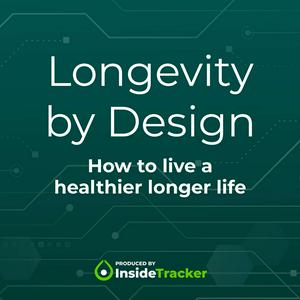In this episode of Longevity by Design, host Dr. Gil Blander sits down with Dr. Ronjon Nag, Adjunct Professor in Genetics at Stanford School of Medicine and President of the R42 Group, for a wide-ranging conversation on how artificial intelligence is reshaping health, medicine, and longevity science.
Ronjon makes the case for systems thinking as a necessary framework for understanding aging, arguing that health emerges from complex interactions rather than isolated interventions. He explains how objective data—ranging from blood biomarkers to wearable-derived signals—can be integrated to guide better decisions, cut through conflicting health advice, and personalize interventions. The discussion also explores how AI is becoming a foundational tool, increasingly as ubiquitous as spreadsheets, enabling researchers, clinicians, and individuals to organize, connect, and interpret fragmented health data.
The conversation then turns to AI’s expanding role in drug discovery, personalized health insights, and ambitious efforts such as vaccines targeting aging biology. Along the way, Ronjon examines both the promise and the limitations of these approaches, emphasizing why interdisciplinary, data-driven methods—and clear thinking about causation, risk, and uncertainty—are essential for extending healthspan and improving long-term outcomes.
Guest-at-a-Glance
💡 Name: Dr. Ronjon Nag
💡 What he does: Adjunct Professor in Genetics
💡 Company: Stanford School of Medicine, and the R42 Group
💡 Where to find him:https://www.linkedin.com/in/ronjonnag
Episode highlights:
[00:00:00]: Introduction
[00:06:40]: Lifelong learning and transition to teaching longevity science
[00:08:03]: Data science and AI in healthcare decision-making
[00:09:54]: Applying financial risk models to medical innovation
[00:11:52]: Venture investing in AI and longevity science
[00:13:29]: Inventing in aging, eye disease, and AI-driven life sciences
[00:15:48]: Impact of AI on the job market and computer science careers
[00:16:26]: Systems thinking in health and aging
[00:18:06]: Causation, correlation, and evidence in lifestyle science
[00:21:00]: Wearables, self-tracking, and feedback loops in health
[00:23:31]: Continuous health monitoring and behavioral change
[00:25:12]: Blood biomarkers as objective health feedback
[00:27:15]: AI’s future impact on biology, aging research, and lifespan
[00:29:03]: Language models, context windows, and the nature of AI intelligence
[00:32:03]: Empathy, ambition, and programming values into AI
[00:34:39]: Guardrails, regulation, and global risks of AI
[00:36:41]: Real-world applications of AI in health and longevity today
[00:39:13]: Integrating fragmented health data and building digital twins
[00:43:23]: Modeling human biology and the future of digital twins
[00:46:36]: AI limitations, hallucinations, and learning from mistakes
[00:48:14]: Risks and limitations of AI in healthcare and medicine
[00:51:13]: AI as collaborator for patients, clinicians, and scientists
[00:55:32]: Longevity ventures: vaccine for aging and food-based GLP-1
[01:09:38]: Fast food, processed foods, and public health
[01:10:03]: Rapid-fire: daily habits, overhyped interventions, and final advice
[01:16:59]: Closing remarks and episode wrap-up
For science-backed ways to live a healthier, longer life, download InsideTracker's Top 5 biomarkers for longevity eBook at insidetracker.com/podcast
Connect with Gil on LinkedIn, Instagram, X


